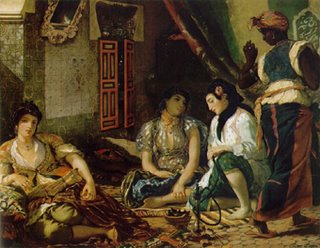
Eugene Delecroix - The Women of Algiers in Their Apartment (1834)
"Orientalism is not a mere political subject matter or field that is reflected passively by culture, scholarship, or institutions; nor it is a large and diffuse collection of texts about the Orient; nor is it representative and expressive of some nefarious "Western" imperialist plot to hold down the "Oriental" world. It is rather a distribution of geopolitical awareness into aesthetic, scholarly, economic, sociological, historical, and philological texts; it is an elaboration not only of a basic geographical distinction (the world is made up of two unequal halves, Orient and Occident) but also of a whole series of "interests" which, by such means as scholarly discovery, philological reconstruction, psychological analysis, landscape and sociological description, it not only creates but also maintains; it is, rather than expresses, a certain will or intention to understand, in some cases to control, manipulate, even to incorporate, what is a manifestly different (or alternative and novel) world; it is, above all, a discourse that is by no means in direct, corresponding relationship with political power in the raw, but rather is produced and exists in an uneven exchange with various kinds of power, shaped to a degree by the exchange with power political (as with a colonial or imperial establishment), power intellectual (as with reigning sciences like comparative linguistics or anatomy, or any of the modern policy sciences), power cultural ( as with orthodoxies and canons of taste, tests, values), power moral (as with ideas about what "we" do and "they" cannot do or cannot understand as "we" do). Indeed, my real argument is that Orientalism is - and does not simply represent - a considerable dimension of modern political-intellectual culture, and as such has less to with the Orient that it has to do with "our" world."
From Orientalism by Edward Said
"[The] key notion of Orientalism itself cannot be confronted without a critical analysis of the particular power structure in which these works came into being. For instance, the degree of realism (or lack of it) in individual Orientalist images can hardly be discussed without some attempt to clarify whose reality we are talking about."
From The Imaginary Orient by Linda Nochlin
"A taste for simplicity cannot last for long."
Eugene Delecroix